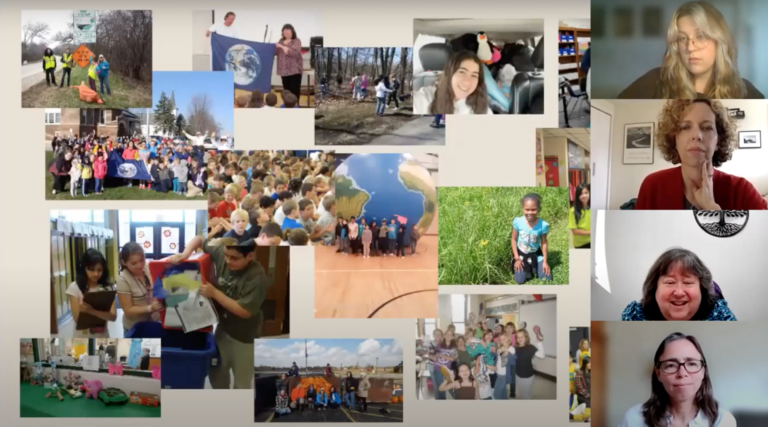
For many schools, going for zero waste may seem daunting. But the Zero Waste Schools (ZWS) program at Seven Generations Ahead (SGA) makes this big goal more achievable. In their recent webinar “Going for Zero Waste at School,” Program Manager, Susan Casey, ZWS Consultant, Becky Brodsky, and SGA Sustainability Program Associate, Elise Pelletier, broke it down for the audience. They were joined by guest speaker Merleanne Rampale, Public Information Officer and Education Director for the Solid Waste Agency of Lake County (SWALCO), who shared her years of experience working with schools to help reduce waste.
The team began with the zero waste hierarchy, which helps prioritize the three classic R’s: Reduce, Reuse, and Recycle. Reduce (or source reduction) is at the top of the hierarchy because it is the most effective way to get to zero waste. The next best strategy is to go for reusables. If reusables aren’t an option, aim to recycle or compost as much as possible.
Among the resources shared was SGA’s Green Locker Clean-Out Guide, which helps schools plan a fun, year-end activity that can keep mountains of materials in reuse instead of sending them to landfills. They also shared how to set up recycling throughout the school and reduce single-use plastics.
Lunchrooms are a huge source of waste in schools, with food comprising the majority of it. The ZWS team highlighted the major factors that contribute to school food waste, then provided an overview of several strategies outlined in the the Food Waste Reduction Toolkit for Illinois Schools, a comprehensive resource developed by SGA and the Wasted Food Action Alliance. Strategies include increasing seated lunch time, conducting taste tests, implementing share tables, starting food scrap composting, and more.
Longtime SGA partner and SWALCO employee, Merleanne Rampale, says the issues around reducing waste are “tremendously important.” In her role, she focuses on helping schools and community groups reduce waste, going beyond the “reduce, reuse, recycle” framework to include composting, repairing, and even rethinking and reimagining waste. She has always had a strong passion for engaging youth on these issues. From compost clubs, to educational scavenger hunts, to a bicycle repair and recycling program, she has prioritized involving kids.
“It’s endless, all the wonderful things you can do with students,” says Rampale. And her biggest advice when creating and implementing zero waste programs is to understand what a community wants. “When you have the buy in and enthusiasm, that’s so immensely important.”
Since going zero waste is a big project for any school, SGA’s Zero Waste Schools team has created a host of resources that can help schools get started no matter how big or small their goals. Getting to zero waste is a journey, so get on the path and keep going!
